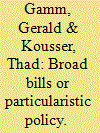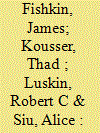|
|
|
Sort Order |
|
|
|
Items / Page
|
|
|
|
|
|
|
| Srl | Item |
| 1 |
ID:
099293


|
|
|
|
|
| Publication |
2010.
|
| Summary/Abstract |
When do lawmakers craft broad policies, and when do they focus on narrow legislation tailored to a local interest? We investigate this question by exploring historical variation in the types of bills produced by American state legislatures. Drawing on a new database of 165,000 bills-covering sessions over 120 years in thirteen different states-we demonstrate the surprising prominence of particularistic bills affecting a specific legislator's district. We then develop and test a theory linking the goals of legislators to their propensity to introduce district bills rather than broad legislation. We find that, consistent with our predictions, politicians are more likely to craft policies targeted to a particular local interest when a legislature is dominated by one party or when it pays its members relatively high salaries. These findings provide empirical support for Key's (1949) thesis that one-party politics descends into factionalism and undermines the making of broad public policy.
|
|
|
|
|
|
|
|
|
|
|
|
|
|
|
|
| 2 |
ID:
142738


|
|
|
|
|
| Summary/Abstract |
Can the people deliberate to set the agenda for direct democracy in large scale states? How might such an institution work? The 2011 California Deliberative Poll piloted a solution to this problem helping to produce proposals that went to the ballot and also to the legislature. The paper reports on how this pilot worked and what it suggests about a possible institution to solve the deliberative agenda setting problem. The legislative proposal passed the legislature but the ballot proposition (Prop 31) failed. However, we show that the proposals actually deliberated on by the people might well have passed if not encumbered by additional elements not deliberated on by the public that drew opposition. The paper ends with an outline of how the process of deliberative agenda setting for the initiative might work, vetting proposals once every two years that could get on the ballot for a greatly reduced cost in signature collections. Adding deliberation to the agenda setting process would allow for a thoughtful and informed public will formation to determine the agenda for direct democracy.
|
|
|
|
|
|
|
|
|
|
|
|
|
|
|
|
| 3 |
ID:
181571


|
|
|
|
|
| Summary/Abstract |
We ask whether party competition improves economic and social well-being, drawing on evidence from the 50 American states for the period 1880–2010. Today, strident party competition and partisan polarization are blamed for many of the ills of national and state politics. But a much deeper political science tradition points to the virtues of competitive party politics. In this historical analysis, we find that states with competitive party systems spend more than other states—and specifically spend more on education, health, and transportation, areas identified as investments in human capital and infrastructure. We find that this spending leads to longer life expectancy, lower infant mortality, better educational outcomes, and higher incomes. Thus we conclude that party competition is not just healthy for a political system but for the life prospects of a state’s residents.
|
|
|
|
|
|
|
|
|
|
|
|
|
|
|
|
| 4 |
ID:
127827


|
|
|
|
|
| Publication |
2013.
|
| Summary/Abstract |
Do big cities exert more power than less populous ones in American state legislatures? In many political systems, greater representation leads to more policy gains, yet for most of the nation's history, urban advocates have argued that big cities face systematic discrimination in statehouses. Drawing on a new historical dataset spanning 120 years and 13 states, we find clear evidence that there is no strength in numbers for big-city delegations in state legislatures. District bills affecting large metropolises fail at much higher rates than bills affecting small cities, counties, and villages. Big cities lose so often because size leads to damaging divisions. We demonstrate that the cities with the largest delegations-which are more likely to be internally divided-are the most frustrated in the legislative process. Demographic differences also matter, with district bills for cities that have many foreign-born residents, compared with the state as a whole, failing at especially high rates.
|
|
|
|
|
|
|
|
|
|
|
|
|
|
|
|
|
|
|
|
|